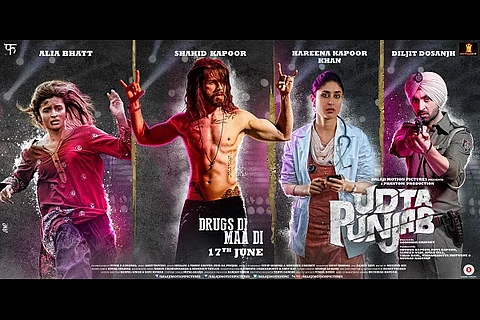

"Udta Punjab" grabs you right from the word go with a funny and subtly intelligent nod to the fate of sportspersons in the subcontinent: heroin gets moved across the border from Pakistan by the expedient of a well-aimed discus throw by an athlete.
Later in the film, when Alia Bhatt’s Bihari migrant vents all of her accumulated trauma at Tommy Singh (Shahid Kapoor) and I learn that among the debris of her life are discarded dreams of a career in hockey, the discus thrower sits uneasily in my mind.
Alia’s Bihari girl caught unwittingly in the drug trade and facing its most horrific consequences joins an interesting ensemble of protagonists. Shahid’s Tommy Singh has made his career by valourising a life of drugs in earthy Punjabi rap, and somewhere along the way wants to get off the drug train and finds his life falling apart. Meanwhile, Diljit Dosanjh is Sartaj Singh, a cop happily living off his cut from the drug trade until his younger brother nearly overdoses on a cocktail of pharmaceutical drugs. Shaken, he teams up with Preet Sahani (Kareena Kapoor Khan), a doctor and activist, to do the right thing.
"Udta Punjab" manages many of the same touches that made “Gangs of Wasseypur” such a great hit: although director Abhishek Chaubey has a heavier hand. It’s language (which so offended the Censor Board) is earthy, and tied nicely to the landscape of Punjab.
It’s soundscape is well-designed, with the tightly written, well arranged songs like “Chitta Ve” and “De Da Dasse” nicely weaving into and pushing forward the narrative. Visually, the film is just as economical and efficient, literally so in its camera angles that stay tightly held on faces through most of the film.
The pace is just comfortably short of frenetic, with the narrative vignettes cycling through with little time for either thought or boredom. And most importantly, the film doesn’t take itself or its subject too seriously, laughing at its characters and the world they inhabit with just as much as ease even when morbid, bloody mayhem is unfolding.
Much of that lightness comes from Shahid, who gives us a wonderful combination of bravado and vulnerability that comes from an entitled but troubled life. While he does not have the self-control he displayed in Haider, and has rougher edges, they’re not so harsh as to derail the film. Alia manages to rein herself in just shy of going overboard into the maudlin.
Diljit Dosanjh was the find of this film for me. He comfortably overshadows Kareena, playing his simultaneously worldly and naïve police officer with a confidence and sureness that is missing in the star.
But it must be noted, there are almost no bystanders in "Udta Punjab". Every character in the film is implicated in the drug landscape the film unfolds, often by the simplest and most direct routes. And they never seem to meet each other, so much as violently clash periodically. In that sense, if it wasn’t for those periodic clashes, all of them would be desperately lonely.
This is reminiscent of much of the recent wave of Hindi cinema of which Anurag Kashyap is probably the most iconic proponent. While this feature keeps these films tautly tied to their landscapes and narrative horizons, it also exoticises these landscapes, hiding entire worlds behind a central plot point. In that sense, one has to wonder if Udta Punjab’s Punjab or Gangs’ Bihar has even a single unarmed resident who is not also a hapless victim.
Looking back at all the controversies and delays involving the CBFC, I can’t help but feel the wait has been worth it.